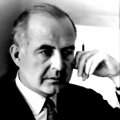
Samuel Barber
Samuel Barber's Violin Concerto Opus 14 is a work that bursts with youth. It was written in 1938, when Barber was just 28. He had already achieved recognition with some small-scale orchestral works, but a violin concerto, that most romantic of forms, was to be his big success.
It was commissioned by millionaire businessman Samuel Fels for his adopted son, the Russian-born Iso Briselli. When Briselli previewed the first two movements, he complained that they were too full of Barber's characteristic lyricism, and without enough technical fireworks to show off his virtuoso skills.
Barber promised to deliver. The resulting finale, a thunderstorm of four minutes duration was so difficult that Briselli declared that he would not (or could not) play it; Fels asked for his money back. Not surprisingly, the
Violin Concerto bears no dedication.
There is a recurring theme in these pages regarding the music of the twentieth century. Modern music is not all dissonant, percussive and ugly. Much of it is just as briliant and beautiful as music of previous centuries, with new ideas and colors added of course.
Samuel Barber fits into the old school. He rejected “
modernism” and deliberately wrote music that was rich in melody, lush in tone, progressive in harmony without being harsh. For this he is known as the American Romantic.

Joshua Bell
Joshua Bell was the same age when he recorded this concerto in 1996 as Barber was when he wrote it. Bell is known for his lyrical tone, intelligent interpretation and technical mastery. This is one work where youth is a definite advantage and Bell brings all these characteristics to the Barber. It is no surprise that he is widely regarded as the greatest violinist of his generation.
From the opening expansive soaring melody to the
tour de force perpetual motion
finale, Bell's performance shines and the listener is captivated. We take little risk in declaring this performance of the Barber
Violin Concerto as the definative version.
Bravo! Joshua Bell!
William Walton - Violin Concerto in B minor
In the same year as Barber, William Walton wrote his
Violin Concerto, commissioned by Jascha Heifetz whom he had met two years earlier. Walton was the decadent man of leisure, a university dropout, living on the patronage of the Sitwell family, and basking in the glory that his
Belshazzar's Feast had brought him.
Walton's music could best be described as patchy. He spent much of the post-War years writing film scores. The viola and cello concertos are light on musical ideas. Even his famous choral work
Belshazzar's Feast is more fun to sing than to listen to.
The
Violin Concerto however is widely praised. It continues to be his only orchestral work that regularly gets perfomed today, especially this year, the centenary of his birth.
Like Barber, Walton wrote melodic, romantic music when the rest of the musical world was experimenting with dissonance and atonality. And like Barber's
Concerto, the
Violin Concerto in B minor by Walton has a beautiful floating quality, but not without complex rhythms and great demands on the soloist.
Ernest Bloch - Baal Shem, Three Pictures from Hassidic Life
Ernest Bloch's
Baal Shem is an exploration of Jewishness, both joys and the sorrows. Originally written for piano and cello, Bloch orchestrated it in 1938, the same year as the Barber and the Walton, the date poignant in light of events in Europe in the succeeding years. The resulting style is very like a violin concerto.
Joshua Bell's sparkling recording is a time capsule from 1938 from three composers who let the disturbing trends of the times, both musical and historical, pass them by. They were the last Romantics.
Please support Good-Music-Guide.com
by purchasing this CD using this link.

Track Listing
Samuel Barber (1910-1981)
Violin Concerto opus 14
William Walton (1902-1983)
Violin Concerto in B minor
Ernest Bloch, Baal Shem
Joshua Bell, Violin
Baltimore Symphony Orchestra
David Zinman, conductor
Samuel Barber, Violin Concerto opus 14
- Allegro
- Andante
- Presto in moto perpetuo
Ernest Bloch, Baal Shem
- Vidui (Contrition)
- Nigun (Improv)
- Simcahs Torah (Rejoicing)
William Walton, Violin Concerto in B minor
- Andante tranquillo
- Presto capriccioso alla napolitana
- Vivace